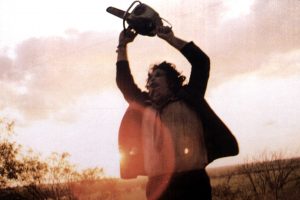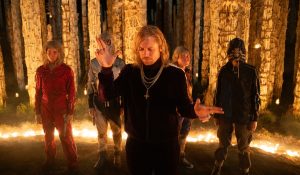
It’s a killer premise: a secret organization called The Lazarus Project exists to prevent the end of the world. Every time global events escalate to the point of no return, Lazarus resets time – taking the entire world back to the most recent 1st July passed (the check point) giving the team time to prevent the catastrophic occurrence. It’s clever and timey-wimey with room to explore the consequences of the resets for the people who are aware of them, but also for the people who are not.
And season two is ramping things up all over again.
“I think it’s more complicated this series,” says series writer Joe Barton. “The first series technically should have been simpler, but because we kept throwing loads of flashbacks in we made it more complicated for ourselves.” Revealing the team’s backstories via multiple resets and flashbacks was part of the genius of the show, highlighting the terrible cost of the resets including the tragic story of Janet and Rebrov’s baby, Shiv’s difficult childhood and Archie’s sacrifice. But season two changes it up with the introduction of a second time machine created by a rival agency The Time Break Initiative which has caused a loop which resets every three weeks. How will they stop it? It looks like Janet is the answer, only she’s somehow been sent back to 2012…
“I struggle with that stuff. Honestly, I’m really easily confused as an individual,” says Barton, when we ask about whether we’ll encounter paradoxes with the 2012 timeline.
“In my head I treated it like 2012 is a place. ‘The past is a foreign country’ – we even reference that quote. Janet’s been sent there and they have to send someone there to rescue her. So that makes sense in my head. She’s in 2012 and other people needed to get to 2012 to help her. She’s been sent to 2012 but then all of the time from 2012 to 2024 has happened… She should walk through the door, like 12 years older [in 2024], but she hasn’t so something obviously happened to her in the past. So they need to go back. But once you’ve gone back, you undo everything, so none of it has happened…”
Got that? If not entirely, don’t worry too much – it’s not really about that according to Barton.
“It’s all about entertainment, really. It’s just about telling a good story. It’s you’re not trying to write a PhD on time loops or whatever. If there’s a certain grounding in logic, then I think as long as it’s entertaining them, hopefully people will go along with it.”
Barton says he relies on script editors and producers to help catch any inconsistencies and they always have the option of adding additional expository dialogue.
“We do all that because we’re worried that people aren’t going to understand and I think often, people get too concerned about that, and maybe don’t trust the audience enough,” says Barton.
“I think with this show people may watch it, and they may not understand all of it. I don’t understand all of it, and I wrote it. But it has its internal logic.”
While not hand holding the audience there are however some useful reminders of the rules within the three week loop. George manages to learn German and recall the moves in a fight in order to defeat an opponent, but he doesn’t get any physically fitter, so he’s still out of breath every time he runs up multiple flights of stairs. Similarly when the Dane is limbering up before the reset he’s told that stretching today won’t help him three weeks ago.
“They are cognitively fit,” says Barton. “There’s lots of instances in the show of a character exclaiming that they are frustrated or confused by time travel, which is very much the writer talking to the audience through their characters.”
Though the show doesn’t reference any other media it does unsurprising encourage comparisons.
“The whole idea of checkpoints from the first series was kind of taken from Sonic,” says Barton. “Then obviously, Looper, Groundhog Day and The Terminator and all of these things. I think it’s more that they’ve sort of entered my brain by osmosis over the years rather than I sat down and though ‘oh, okay, this is this and this is that.’”
There are added conflicts – George has killed a bunch of people and is condemned to shoot Shiv at the very start of the time loop (since he’d already pulled the trigger). Sarah has taken the serum and is aware of the time loops. And Wes is mad as hell at George for betraying them. And then there’s the Time Break Initiative.
“The Time Break Initiative is like a rival Lazarus project and their big aim is to invent a true time machine, like a proper go wherever you want, go back in time machine,” says Barton. “They are the ones who have caused the three week loop by essentially creating the second black hole, which keeps destroying the world. The plot is all about undoing the mess they’ve done, but having to use the machine that they’ve created to do that. It’s about who’s right and who’s wrong. Like, are they the baddies? Or are the Lazarus Project? Are there any goodies? They’re just a fun, opposite for the Lazarus gang.
Outside of the time travel elements, Barton’s key intention is that the show should be fun and not take itself too seriously despite traversing big topics like the end of the world.
“Almost everything in life, people will use humor to try to make sense of or get through. I think there’s quite a British thing for resonating with gallows humor. And I just think it makes it more interesting as well. I mean, think the worst version of this would be like the super serious version,” he says. “I just wouldn’t want to watch it.”
The Lazarus Project S2 is available on Sky Max and streaming service NOW
The post The Lazarus Project Season 2’s Time Travel Rules Explored appeared first on Den of Geek.







